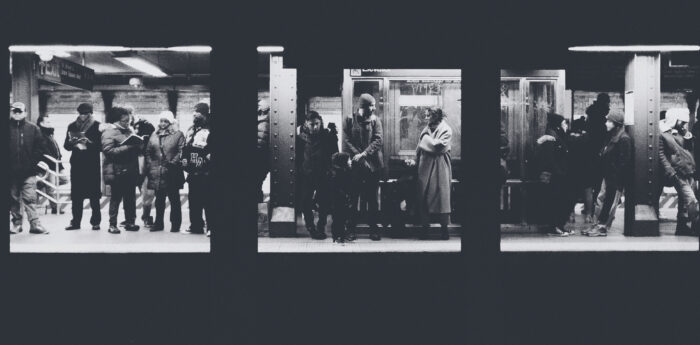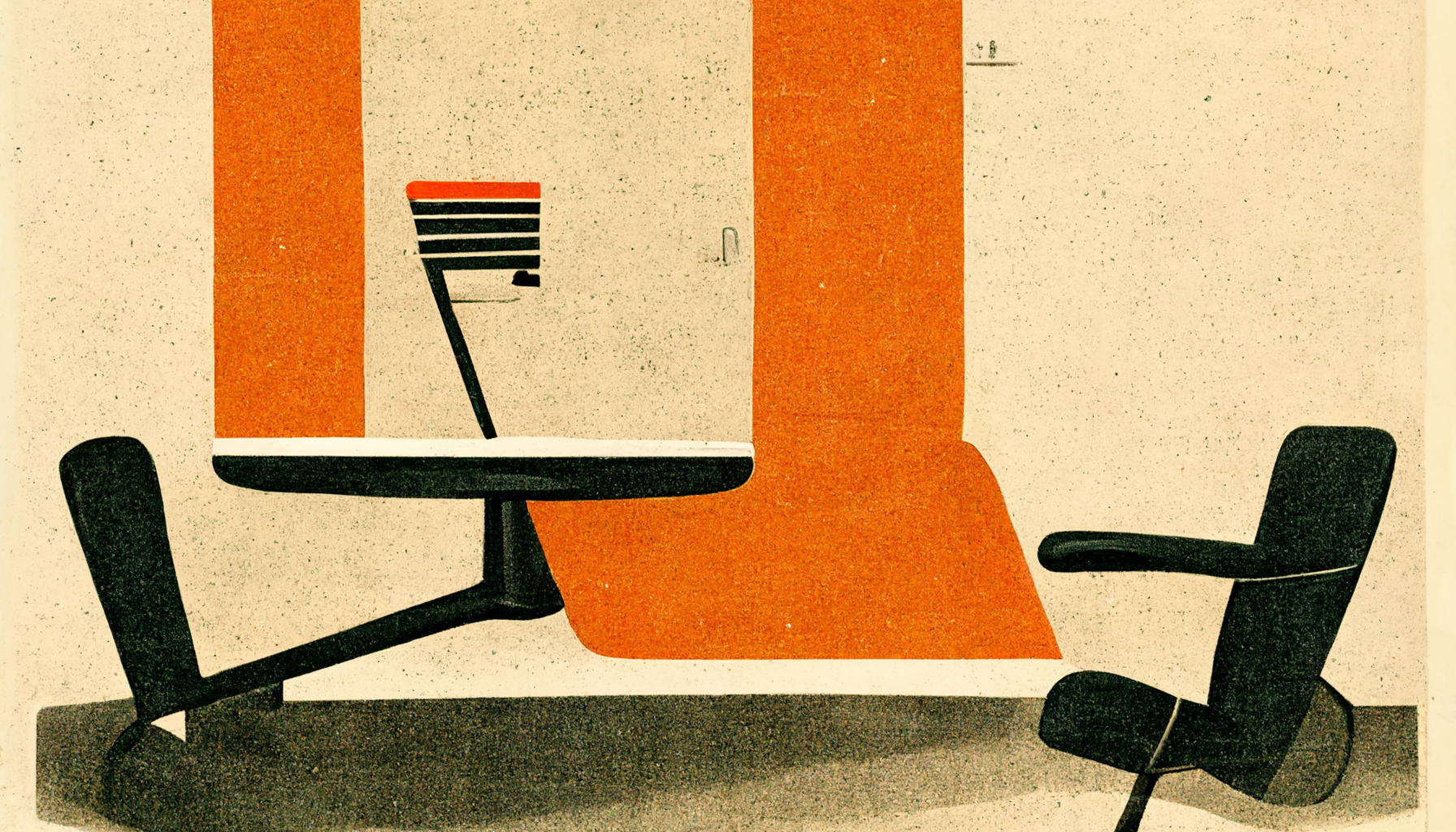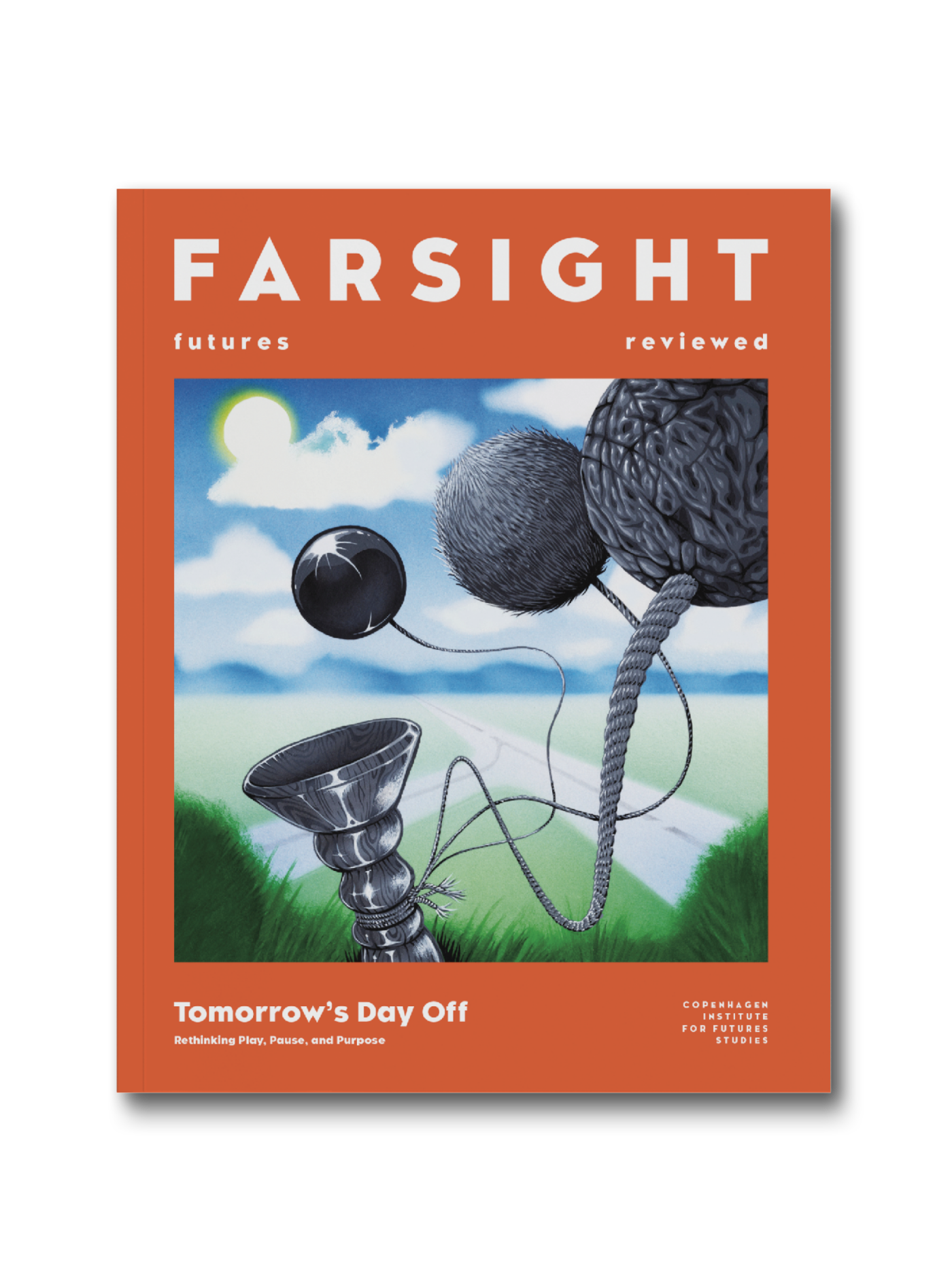
In turn, we use cookies to measure and obtain statistical data about the navigation of the users. You can configure and accept the use of the cookies, and modify your consent options, at any time.

Freedom From Work
Amid job automation, a push toward shorter work weeks, and growing political interest in UBI schemes, why is the idea that work is virtuous still so pervasive?
Illustration: Midjourney AI
In the late 1880s the artist William Morris proposed a future in which we worked only 24 hours a week. Some decades later, during the Great Depression, the economist John Maynard Keynes went further, reckoning we’d all have a 15-hour working week by the end of this decade, and that we would enter an “age of leisure and of abundance”. Indeed, big thinkers have long proposed that society would inevitably move towards a future of less work and more leisure. And they were partly right: from 1800 to the 1970s, thanks to unionism and enlightened employers, working hours were gradually eroded until we arrived at the archetypal ’40-hour week’.
Now, it’s proposed, robotics and AI will hasten radical change for employment – in short, there may be fewer and fewer jobs to go round. Some developments already point in this direction: in the US, the share of prime-age men neither working nor looking for work has doubled since the 1970s, and the number of jobs in manufacturing is down 30% since just 2000. AI is poised to set in motion a new wave of job automation, perhaps further eroding the share of ‘good jobs’ available to humans.

Broaden your horizons with a Futures Membership. Stay updated on key trends and developments through receiving quarterly issues of FARSIGHT, live Futures Seminars with futurists, training, and discounts on our courses.
become a futures member“That’s the elephant in the room for this discussion about moving to a ‘post-work’ society,” says UTS Business School professor Peter Fleming, author of The Death of Homo Economicus. “The demand for labour just isn’t there anymore, which is why you see service workers [in the United States] needing two or three jobs to stay afloat [and over-qualified, debt-burdened graduates waiting tables. And a service economy just doesn’t make jobs as manufacturing once did. But nobody in power ever admits as much. Elections are all about job, jobs, jobs, not how we need to change our approach to work.”
Certainly, from the UAE to Iceland and the UK, around the world many societies are exploring ideas the likes of the four-day working week and various kinds of Universal Basic Income, the feasibility of which has, it’s been argued, been demonstrated by the provision of pandemic furlough schemes. After all, as those utopians suggested, surely progress is measured by less work? This used to be the consensus, and the so-called Great Resignation and China’s ‘lying flat’ movement suggest that’s an idea people are looking to revive.
Well, some people at least. Not everyone is sure that working less is a good idea. The belief in the virtuousness of work is a stubborn one, underpinned as it is by religion and the pervasive Protestant work ethic – the notion that working hard will save you from damnation. To this we can add what might be called the Self-Help/Time Management Industrial Complex and its insistence that we should feel guilty whenever we’re not being productive. Work is as central to our politics, economics, and social lives as it ever was.
“The ideology of work is still just so strong. Work holds this cultural kudos: if you work, you’re a ‘good citizen’, a ‘contributor to society’. But as the need to work becomes less it becomes dangerous for the ruling elites to insist on that idea, for them to up the ante on the moralism,” reckons Fleming.
Jack Kellam, of the independent future-of-work research organisation Autonomy, notes that the four-day weeks trialled with many companies in the UK have seen success through increased efficiency. People, it seems, can work fewer hours over a week but remain as productive as before. He concedes that this opens the question of whether workers are simply more tired for their three days off. “But it does at least suggest that the five-day week is more an arrangement of habit, and not necessarily the best way to arrange work or society,” he argues. Getting that idea widely accepted is another thing.
The deep antipathy felt by some towards UBI schemes is a further case in point. UNESCO recently published a paper arguing that decades of evidence shows that UBIs (or “unconditional national dividends”) simplified welfare systems, empowered women, and improved health, among other benefits. And yet those institutions that oppose its introduction often do so on the judgement that they would fail to alleviate poverty or fix broken welfare systems – which isn’t something UBI schemes typically claim to address – and only encourage people to slide into laziness and dissolution. This, while somehow not seeing the lack of labour in the rich as similarly problematic.
“As traditional faiths have receded somewhat, we’ve filled the gap with the faith of work – for meaning, our identity, our place in society, and as the focus of how we interact with each other. And work has its true believers,” argues Benjamin Hunnicutt, professor of history at the University of Iowa, and author of Free Time: The Forgotten American Dream. Less than a decade ago he faced death threats in response to writing an article proposing the introduction of a UBI in the US. “Work has even become the primary way in which we judge each other, a focus of our morality. Society instils in us the belief that if we work hard, all sins are forgiven. If you toil hard enough, you can ignore your children’s piano concert, or whatever. ‘Having to work’ excuses anything. And it’s been so long it’s hard to imagine a realistic moral alternative to work. So, there’s a fear of leisure.”
Yet some have argued, such as the moral philosopher Bertrand Russell, that we are at our most creative in our leisure time, and that the big ideas beneficial to society come from having the space and means to think widely. In the 21st century, ever cheaper technology, such as the likes of 3D printing could provide opportunities for a mass revival in craft making. Communities could be formed around the exchange of talents developed for pleasure rather than purely for pecuniary advantage. More leisure could allow the building of better bonds with friends and family.
But perhaps the naysayers of leisure are right. In a now classic study from 1989, the psychologists Judith LeFevre and Mihaly Csikszentmihalyi found that “the paradox of work” is that people are often happier complaining about it than wallowing in too much leisure time. Another study by Csikszentmihalyi, this one from 1999, suggested that when we’re given freedom, invariably we don’t know what to do with it. Small wonder that a UCLA Anderson School of Management study in 2018 revealed that working Americans’ life satisfaction started to tail off if they had any more than 2.5 hours of free time a day.
“Work that is properly organised and meaningful is important for human flourishing. It doesn’t have to be wage labour either. People need to be needed, not to feel useless,” argues Elizabeth Anderson, professor of philosophy at the University of Michigan. That’s why a 1993 study suggests that those who engage primarily in challenging activities in their leisure time, socially or solo, can find their self-esteem boosted in the ways work typically provides.
“To be sure there will be people who can find meaning in a life of pure leisure – not that such a thing can be universalised, because robots won’t be able to do everything,” Anderson adds. “My concern is that there are also people who do need to just keep working in a disciplined way. And the idea of a society in which nobody works, not even in non-wage work, strikes me as dystopian.”
Our inability to use leisure time to our satisfaction might actually pose a psychological threat. While work is guided and mandated, we’re paralysed by the endless choice of how to spend our time off. It’s the Netflix experience of endless perusing and little actual viewing. Hard work itself makes embracing leisure time all the more challenging. Psychology talks of the phenomenon of ‘ego depletion’ said to result from a day of work: all our effort put into those eight or so hours leads to a temporary decrease in self-control and executive function in our remaining leisure time. Inevitably, many of us lean into the undemanding.

Explore the world of tomorrow with handpicked articles by signing up to our monthly newsletter.
sign up hereThen there are the expectations we have of our leisure. An Ohio State University study in 2021 concluded that many of us have internalised the work ethic to the extent that the greater our sense that our leisure is wasteful, the less happy we are.
Deeply entrenched now, in some cultures more than others, is the sense that leisure must have ‘hedonic utility’, that is to say the taint of work. It’s a notion typically played up by those with very little leisure time, primarily the highly educated (and, arguably, influential) in well-paid jobs requiring long hours. Meanwhile, to have no leisure time, because of too much work, has even come to be seen as affording bragging rights rather than demanding sympathy. Productivity has become conspicuously performative, argues Anderson, when once it was our scope for recreation that inspired envy.
And yet maybe we are just so consistently sold into set ways of thinking about work that it will take time, decades maybe, to replace it with a new pro-leisure doctrine. We will need to reset how we think about leisure, so it no longer is considered a means to recuperate in preparation for more work.
“That, in South Korea, for example, it’s taking the state to intervene, through advertising campaigns, to encourage people to spend less time in the office speaks to the inability we have to get rid of the work ethic,” suggests Erik Gandini, professor of documentary film at Stockholm University of the Arts and the director of new documentary After Work.
“We’ve been trained to think of work as being the ultimate point of our lives and there are forces that benefit from that idea,” he adds. “What’s needed is a counter training to understand what we might do with more freedom, to help us get over the element of panic that seems to come with that idea. There’s a mistrust in humans, a lack of confidence in the idea that most people would still want to be ‘doing’ something, and simultaneously an intolerance of the idea that what that something might be is up to them.”
So where are we at? We have a culture that privileges work but seems unable to provide work of substance for the majority, while apparently diminishing our leisure experience too. Of course, there is that rough third of the working population said to love what they do, but a 2014 Gallup poll concluded that a small majority of American workers “do not feel involved in, enthusiastic about, or committed” to their work. Those things we might hope for from a job, like autonomy or fulfilment, they find sorely lacking. Maybe then the issue is not so much that more leisure is too taxing for us to make good use of. Perhaps it has more to do with the fact that work, as it is currently conceived, is simply not sufficiently rewarding for many of us to devote most of our waking lives to.
“The fact is that work is getting worse and worse for workers,” argues Anderson, author of the forthcoming Hijacked: How Neo-Liberalism Turned the Work Ethic Against Workers. “Neo-liberalism, broadly, has seen corporations acquire the power to extract wealth from workers without adding value. And that’s turned into shareholder capitalism, in which the purpose of a corporation is to dish out money to shareholders. Or a business model that’s all about building brands, and outsourcing all the actual work, which pushes workers to the periphery of concern. In so much work now, employees have just been made infinitely replaceable. And we haven’t even begun to grasp the massive adaptation that climate change will require [of work and workers].”
Conspiratorial it may sound, but some argue that, with many governments fixated on a growing economy – one that, in many countries, grows through consumption rather than manufacturing – keeping people in jobs that provide the disposable income to spend on more stuff has become essential. Beyond the income it provides, this system does nothing to improve the value of the work to those who do it. Nor does it do anything to arrest the inexorably slowing of the value of what is produced per hour worked.
Karl Marx outlined the fundamental contradiction of capitalism: It could provide the organisation and production systems needed to abolish what he called “alienated” work, and give us all so much more free time, yet it clings to work as if it was the only possible organising principle both for society and people’s lives.
As the late anthropologist David Graeber noted, this system now appears to be shored up by so many of what he provocatively called “bullshit jobs”. The true function of these seems not to in any way contribute to society, or to the individual’s well-being, but rather to fill their time and keep them in their place.
“Huge swathes of people spend their entire working lives performing tasks they secretly believe do not really need to be performed. The moral and spiritual damage that comes from this situation is profound,” Graeber wrote. “It’s as if someone was out there making up pointless jobs just for the sake of keeping us all working…”
Might now, asks Hunnicutt, more of us finally be coming to openly acknowledge, as an existential challenge, that most people find their work to be unengaging, repetitive, and boring?
“For the vast majority, work fails to deliver on its promises. There’s a disconnect between their experience and what they believe work should offer. They don’t believe there’s a pot of gold at the end of the rainbow that is their job or some career. And that’s changing our conception of work dramatically, with political and social implications,” he says. “The failure to imagine a life centred outside of the workplace, on free time, on leisure, remains a great impediment. But as Keynes said, that change is going to come. And it’s in the realm of that freedom, not in work, that we can find the richest kinds of human experience.”

Read the latest issue of
FARSIGHT: Tomorrow’s Day Off
Grab a copy here